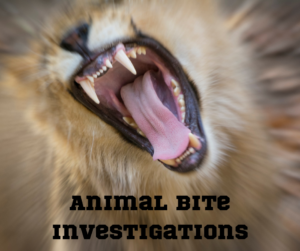Previous
Next
Muhlenberg County Health Department Rabies Information
Animal Bites and Rabies Rabies is a serious disease that is caused by a virus. Each year, it kills more than 50,000 people and millions of animals around the world. Any mammal can get rabies. Raccoons, skunks, foxes, bats, dogs, and cats can get rabies. Cattle, horses and humans can also get rabies. Animals that are not mammals such as birds, snakes, and fish do not get rabies.

Program Standards: All dogs, cats, and ferrets reported to have bitten any person are quarantined by the Local Health Department for ten (10) days for observation. This is done at either the animal owner’s home or a local animal clinic. Some general signs of rabies in animals are as follows:
• Changes in an animal’s behavior like aggression
• General sickness
• Problems swallowing
• Increased drooling
DO NOT SHOOT OR DAMAGE THE ANIMAL’S HEAD IF IT HAS BITTEN SOMEONE!
Dogs, cats, and ferrets, which stay well during the ten-day period, are released. Those animals which become sick are humanely euthanized and tested in the State Rabies Laboratory.
All non-domesticated or “wild animals” must immediately be humanely euthanized and tested in the State Rabies Laboratory. Domesticated farm animals are evaluated on a case by case basis. *Note: Head of animal must be unaltered in order for laboratory to test. For more updated information, you can click on this link for the Center for Disease Control.
What to do in Case of an Animal Bite?
Depending on the severity of the bite, call your doctor or go to a hospital emergency room.
Take a description of the animal
If possible, without endangering yourself, confine the animal so it can be quarantined.
If euthanized, DO NOT DO ANYTHING WHICH WOULD DAMAGE THE ANIMAL’S HEAD! THE HEAD MUST BE INTACT FOR TESTING.
Call the Local Health Department to begin investigation of the incident.
Rabies Prevention
Rabies vaccines are approved for dogs, cats, horses, cattle, sheep and ferrets. KRS 258 requires that all dog, cat, and ferret owners have their pet initially vaccinated by the age of three months and revaccinated against rabies at the expiration of the immunization period as certified by a veterinarian. Proper and up to date vaccination of your pets is the first line of defense against rabies. Animal rabies vaccines should be administered only by or under the direct supervision of a veterinarian.
Dog Bite Prevention 4.5 million Americans are bitten by dogs each year, and one in five dog bites results in injuries that require medical attention.
